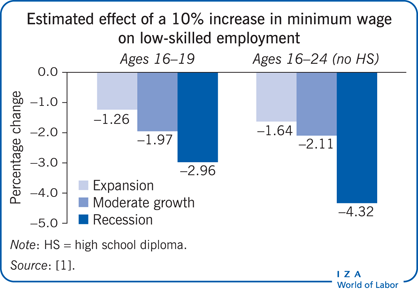Elevator pitch
Proponents of minimum wage increases have argued that such hikes can serve as an engine of economic growth and assist low-skilled individuals during downturns in the business cycle. However, a review of the literature provides little empirical support for these claims. Minimum wage increases redistribute gross domestic product away from lower-skilled industries and toward higher-skilled industries and are largely ineffective in assisting the poor during both peaks and troughs in the business cycle. Minimum wage-induced reductions in employment are found to be larger during economic recessions.
Key findings
Pros
Minimum wage increases are more likely to deliver income gains to low-skilled workers during peaks rather than troughs in the business cycle.
Increases in the minimum wage may stimulate macroeconomic growth if productivity is shifted toward more highly-skilled sectors, possibly by inducing additional training for low-skilled workers.
When increases in the minimum wage are indexed to inflation they do not appear to have larger adverse employment effects than non-indexed increases.
Cons
Increases to the minimum wage redistribute the composition of industry-specific productivity in ways that harm some low-skilled workers rather than produce net economic growth.
Minimum wage increases reduce employment more for less-skilled individuals during times of macroeconomic recessions as compared to expansions.
Minimum wages are not well targeted to poor or near-poor individuals across the business cycle.
Minimum wage increases are ineffective at reducing poverty during both business cycle peaks and troughs.
